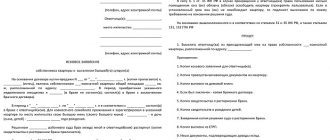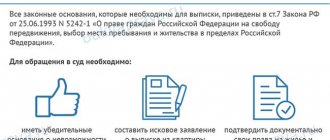The director of the legal service “Unified Center for Protection” (edin.center) Konstantin Bobrov answers:
If a young son has other housing, then it is possible to go to court with a claim to recognize the father and son as having lost the right to use the residential premises. However, if the child has no other housing, the guardianship authorities will not allow his legal eviction. Since the Family Code gives children the right to live with their parents, the legal eviction of a father and young son will be extremely difficult.
What is social housing and who is it for?
How can I prevent my grandson and daughter from applying for an apartment?
Is it possible to discharge a child from a municipal apartment?
The legislation protects the right of minors to housing especially carefully. Their compliance is monitored by regulatory authorities represented by:
- prosecutor,
- courts,
- guardianship authorities.
It is almost impossible to discharge minor citizens from the living space they occupy. However, the answer to the question whether it is possible to discharge a minor from a municipal apartment may be positive in the case of:
- illegal registration of a child (although this circumstance is not always taken into account by the court);
- availability of statements from both parents providing evidence that the child will be registered in housing with better living conditions.
The head of the legal support department, Ksenia Buslaeva, answers:
The issue of deprivation of the right of registration and residence by tenants of municipal apartments can be raised after six continuous months of non-payment of utility bills. This is stated in Article 90 of the RF Housing Code. However, the decision on forced deregistration is made only in court, and the court will definitely consider the reasons for non-payment. He will classify as valid: systematic delay in payment of wages (pension, other means of subsistence, etc.), disability, guardianship of a dependent or minor; It is quite possible - ignorance of the existence of debt and other reasons. Only the owner of the premises, that is, the municipality, can act as a plaintiff in the case.
How to buy a room from the municipality?
Can I be deprived of the right to live in a service apartment?
What categories of citizens cannot be discharged from municipal housing even through the court?
Some categories of citizens cannot be deregistered and forcibly evicted even through court proceedings. In exceptional cases, carrying out such actions will require a significant investment of time and effort. Such persons include:
- orphans;
- minors;
- old age pensioners;
- disabled people of groups 1 and 2 who became disabled due to the performance of official/military duties or due to an occupational disease;
- family members of missing or killed employees of the Ministry of Emergency Situations, customs, internal affairs bodies, military personnel and penitentiaries;
- family members of the deceased tenant of the apartment.
CENTURY 21 Russia lawyer Damir Khakimov answers:
Residents can be forcibly expelled from a municipal apartment if they have moved to another place of residence, that is, they are constantly absent from their place of registration (Part 3 of Article 83 of the Housing Code of the Russian Federation). At the same time, in court you will still need to prove that these residents left the place of registration voluntarily, and not forced, and also that their absence is not temporary (due to study, treatment, service, etc.). The court will also take into account the fact of failure to pay for housing and utilities.
Failure to pay may itself also be grounds for eviction, but in this case the landlord (municipality) is obliged to provide alternative housing.
Conditions for discharge from public housing
A municipal apartment is the property of the city administration. The municipal housing fund acts as a landlord, renting out an apartment to a tenant. The person registered in a particular dwelling is the tenant. The grounds for expulsion, on which he may lose the right to registration and residence in this premises, are contained in Art. 91. However, this does not happen automatically, but by court decision, in accordance with Art. 35 Housing Code of the Russian Federation.
A citizen can be discharged from municipal housing only if all the conditions listed in . In this case, it does not matter whether the person is included in the social tenancy agreement (in the warrant) or is simply registered as a family member in a municipal apartment.
How to discharge a tenant for immoral behavior
One of the grounds for filing a claim in court for the purpose of expulsion from a municipal apartment is a violation of the rules of residence:
- alcohol abuse;
- drug use;
- constant scandals and quarrels with other residents.
In order for the statement of claim to the court to be convincing and influence the positive outcome of the case, it is first necessary to warn the registered person about the inadmissibility of such behavior, and then file a complaint with the municipality, attaching copies of evidentiary documents to the statement of claim.
Deregistration for improper use of housing
It is possible to discharge a citizen from municipal housing if there is evidence that he is not using the premises as a place to live.
Inappropriate use must be certified by special housing commissions that operate under all city and district administrations, or precinct district offices.
You can contact these authorities:
- municipality,
- neighbours,
- HOA board or .
After receiving a conclusion about the use of living space for other purposes, you can file a claim with the court for the discharge and eviction of a registered person who violates the established rules.
Statement for non-payment of utility bills
Another legal basis for deregistration is to deregister a person if he does not pay for utilities.
It is worth considering that if for more than six months one of the registered residents - members of the tenant’s family - does not pay for light, gas, electricity and other services provided in accordance with agreements between the consumer and suppliers, then the tenant himself is responsible for this. In this case, an attempt by a responsible tenant to discharge a defaulter by indicating this reason may result in trouble for himself and the entire family.
If the trend of non-payment is stable and irreversible, it is necessary to divide personal accounts, renew the social tenancy agreement for several tenants and begin the procedure for the discharge/eviction of the persistent defaulter.
Discharge due to long absence
It is also possible to discharge a person from a municipal apartment if he does not live in it. The court will satisfy the claim on this basis if the registered person:
- does not live in the apartment for a long time (clause 3 of article 83 of the Housing Code of the Russian Federation). Although the minimum is not established by law, a period of one year is actually taken into account;
- left on a permanent basis along with the property belonging to him, and not temporarily (for example, for the purpose of traveling to study, work, on a business trip, for treatment, etc.), which does not entail a change in the rights and obligations in relation to municipal housing (Art. 71 Housing Code of the Russian Federation);
- changed his place of permanent residence voluntarily, and not under duress or because of conflicts that made it impossible for him to stay in his home;
- during his absence, he did not partially or completely pay utility bills, did not take part in the maintenance of the apartment and its repair (part 4 of article 69 of the Housing Code of the Russian Federation);
- made no attempts to move into the home again, and in the presence of such attempts, did not encounter obstacles to her actions.
Lawyer, Chairman of the St. Petersburg Bar Association Globus Pravo Denis Volnov answers:
Theoretically, you can go to court to recognize citizens as having terminated the right to use residential premises and subsequently deregister them. In practice, with the proper approach of your opponents, it is very difficult to win such a case. The problem is that defendants in such cases take the position that they do not live in the apartment due to conflicts with the plaintiff. There are clarifications from the Supreme Court of the Russian Federation on such grounds, and the courts reject the claim.
Your situation is further complicated by the fact that one of those registered is a minor. At the same time, you have the right to recover part of the utility bills, but for a maximum of the past three years (statute of limitations).
What kind of government support can you get if you don’t own a home?
Can I be denied registration in the apartment where my family lives?
Extract without consent
We often receive calls with questions about discharges from council housing without consent. Usually they want to deregister the same employers without their consent for privatization. It is impossible to discharge a person from a municipal apartment without consent, since all tenants have equal rights and obligations.
If a person lives in an apartment and pays his dues regularly, then it is impossible to get rid of him.
There are also situations when, due to hostile relations between employers, a conflict arises. As a result of this conflict, a situation may arise where one tenant remains to live in the apartment, and the other tenant is not allowed to live in the apartment, despite the fact that they have the same rights of use and disposal.
Dear readers!
Our articles talk about typical ways to resolve legal issues, but each case is unique. If you want to find out how to solve your specific problem, please contact the online consultant form on the right →
It's fast and free! Or call us by phone (24/7):
If you want to find out how to solve your particular problem, call us by phone. It's fast and free!
- If the apartment was purchased before marriage, then after the divorce the ex-spouse loses the right to live in it. Eviction will occur either voluntarily or forcibly, i.e. through the court. In the latter case, there is no point in filing complaints, because this is the rule of law that everyone is obliged to follow;
- If the housing is not privatized, but is municipal, then its improper use can lead to the eviction of the person or people living there. To do this, you just need to write a statement with a list of grievances and send it to the employer. And if a person does not correct the situation, then he is evicted;
- If a person does not want to pay for utilities and does not live in the apartment for a long time, then he can also be evicted and deprived of his registration;
- When parents lose custody, they must, by court decision, move away from the child to another location;
- If a person was registered in a home after privatization, the owner can evict him at any time, but this does not apply to minors (persons under 18 years of age);
- If the housing you received as a gift already had several people registered and living there.
We invite you to familiarize yourself with: State registration of an apartment donation agreement
In order to forcibly deregister a person from a residential property, it is necessary to correctly draw up an application and collect evidence indicating that persons are living in the premises without the consent of the owner of the property.
Legal status of persons living in non-privatized housing
The owner of the municipal premises is the local authority. He manages the housing stock and has the right to allocate housing for citizens to live in under special conditions. A social tenancy agreement is concluded with the main tenant, the standard form of which was developed by the legislator. The document is concluded for an indefinite period.
The agreement does not mean that the tenant becomes the owner of the premises. He only rents housing from the authorities. At the same time, the employer and the owner have rights and obligations in relation to each other. The responsibilities of the tenant are (Part 3 of Article 67 of the Housing Code of the Russian Federation):
- use of the transferred premises for its intended purpose,
- ensuring the safety of real estate and maintaining it in proper condition,
- carrying out current repairs (major redevelopments are carried out only by the owner at the request of the tenant),
- payment of utility bills and payment for the provided premises,
- informing about changes in the grounds for residence.
In accordance with Art. 68 of the Housing Code of the Russian Federation, an employer who does not fulfill the listed duties is liable.
Constant violation of living conditions entails issuing a warning to the main tenant of the apartment; if it does not have an effect, the authorities or interested parties go to court, and the tenants are evicted (Article 91 of the Housing Code of the Russian Federation).
Thus, deregistration from an apartment owned by the municipal housing fund is possible only on two grounds:
- at the written request of the employer himself,
- By the tribunal's decision.
There is another reason for eviction - demolition of the house in which the landlord lived. But in this case, the relationship between the owner and the tenant does not end - the residents are simply moved to another premises.
conclusions
A registered citizen can be removed from registration in a municipal apartment with his consent or through the court. Before applying to the court, the tenant must notify the landlord of the existence of grounds for applying to the court with a request to write out and evict from the living space a person who violates the norms and rules established by law.
If the receipt of a warning letter does not have an effect on the tenant and does not eliminate the grounds for filing a claim, the responsible tenant has the right to apply to the court to remove the person from the apartment, which is used under a social tenancy agreement. An exception may be made for certain categories of persons established by law.










